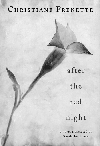
After The Red Night
Christiane Frenette
Cormorant Books
$21
paper
162pp
978-1-897151-14-3
The characters in question, Thomas, Romain, Marie, Lou, and Joe (we know them by their first names only) are perhaps not so central as a traumatic event that binds them together: a fire that razed about half the town of Rimouski in 1950, known locally as la nuit rouge, from which the book takes its title. Although no one died in the fire, it is described in holocaustal terms.
Thomas, a bright, eccentric young man already tending towards madness, has his memories erased by the conflagration and is interned in an asylum. “The gaping hole in the city, the burned-up part of the world, must resemble his brain. He couldn’t remember a thing.” After five years of shock treatments that maim him psychically and physically, he is released back to his neighbourhood “eager to start all over again,” to heal his charred, fragmented self. He meets Romain, his best friend from childhood, now a respected family physician, his wife Marie, and their three young children. Theirs, on the surface, is the picture-perfect ’50s family ideal. Despite the evident contrast between them, Romain and Thomas renew their friendship, although Romain was in Quebec City at medical school when the fire took place – hence his recollection is “useless,” a “prefabricated memory that knows everything that needs to be known…but from the outside.” Better able to relate is Marie, fellow eye-witness who also describes herself as a “burn victim,” although we soon learn the conflagration that has scarred her is marriage. Like Kitty Fane in The Painted Veil, she is a doctor’s trophy wife. All her domestic chores seem ridiculous when Romain in his office on the other side of the living room wall, is “busy saving humanity.” When Thomas, in need of work, agrees to garden around their house, their furtive sharing becomes a balm to untended inner wounds, and this leads to a more intimate relationship.
Flash forward to Chicago, 2002. Lou, Romain and Marie’s estranged daughter, has not been home for decades. A teenage runaway who has allowed herself to be whisked away by Joe, an outgoing but naïve American, she is truly skilled at putting the lid on bad memories, and believes she is happier far away from the toxic atmosphere of home. “Above all I didn’t want to solve the mystery,” she confesses. “In the civilized little tribe formed by the six of us, there was a wound so raw, so hot.” But, decades later, when Joe is partially paralyzed by a brain aneurism, she is drawn by profound, half-acknowledged need to “end her fugue state” and return home.
The challenge for the reader in following the twists of this story (events of 1950 and ’55 are interspliced with those of 2002, first person narration with third) is an unsettling sense, especially in early on, of observing characters that one cannot clearly identify. A reader might find himself consulting the blurb on the French flaps to make sure who is who. Frenette’s writing – conveyed with grace and nuance by Sheila Fischman’s translation – is spare, her characters’ reserve and suffering cleanly and clearly revealed. But like carefully sculpted glass beads, the fragments are drawn masterfully together into a coherent pattern. For a novel born in fire, what seems an emotionally cool experience warms into a hot one. Like many a family secret, the most crucial details – including whose daughter Lou really is – remain to be surmised. The weight of the unacknowledged haunts the characters and eventually, the reader. In the end is a novel to be savoured and resavoured, which yields remarkable depths in reading and re-reading. mRb






0 Comments